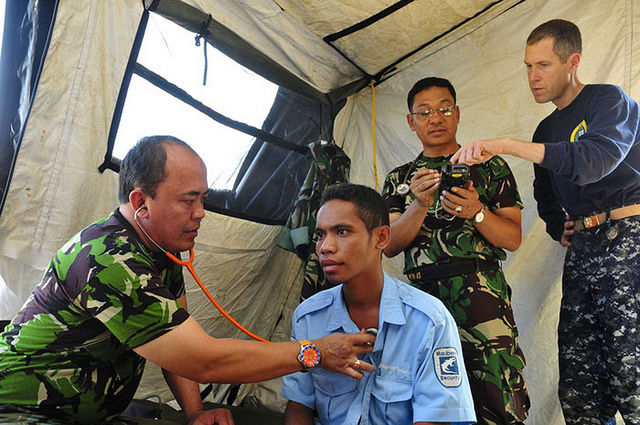 In my last post,
I argued that critics of Indonesian military (TNI) reform are taking
too narrow a view of its progress. For most critics, the primary
yardstick for measuring the success of TNI’s reform agenda has been a
2004 law, which laid out a roadmap and a timetable for recasting the
military in line with modern liberal democratic norms. This is
considered by many the ‘be all and end all’ metric for TNI reform.
All organisms, physical or organisational, continuously evolve. For
example, our own defence force is currently engaged in organisational
renewal and is undergoing cultural change.
Even if TNI reform has inched forward by some standards, the wider
process of post-New Order professionalisation has been progressing apace
for 15 years. TNI modernisation and professionalism have been advanced
with every TNI unit assigned to UN peacekeeping duties, with every
officer trained at overseas staff colleges and with every training
exercise involving modern armed forces. To discount this, or to view TNI
reform exclusively through a blueprint laid down in 2004, demeans the
impressive strides made by the Indonesian people and their body politic
throughout the Reformasi era. TNI has largely kept pace with political transformation.
All armed forces are, to a greater or lesser degree, reflections of
their wider societies. Just as Indonesia has undergone fundamental
change, so too has its military establishment. Assessing TNI reform as
if trapped in a time capsule, without considering the shaping and
influencing effects of wider societal and organisational developments,
misses a fundamental factor in the equation.
In broad terms, we might consider three approaches to evaluating the
process of internal reform by TNI since the fall of Suharto. The first
is a comparison of TNI with other professional armies around the world.
The second is a comparison of TNI today with its Suharto-era
predecessor, the Angkatan Bersenjata Republik Indonesia (ABRI). A third
approach is to benchmark military reform against the reforms achieved by
other organs of Indonesia’s democracy, such as political reform, law
and justice sector reform and economic reform.
Though by no means perfect, TNI measures up demonstrably well, by any
reasonable standards, against the armies of the world’s most advanced
democracies, against its New Order incarnation, ABRI, and also relative
to other arms of Indonesian government. For
example, TNI performed well compared to other Indonesian government
organisations in terms of complaints received in 2010 by Indonesia’s
National Human Rights Commission.
To be fair, TNI isn’t the only military force in which rogue
elements, in isolated cases, abuse the human rights of civilians in the
field. And fault lies not just with under-trained and poorly-led armed
forces like the atrocious Bulgarian battalion in early 1990s Cambodia.
One only has to recall scandals involving Italian and Belgian units in
Somalia, along with abuses in the same UN operation which led to the disbanding of Canada’s elite Airborne Regiment.
In more recent times, the random murder and mutilation of Afghan
civilians by self-appointed ‘death squads’ of the US 5th Stryker Combat
Brigade, along with images of US Marines urinating on Taliban corpses,
are stark and offensive reminders that all conflict can potentially
bring out the worst in those waging it. There is absolutely no excuse
when unaccountable power is employed malevolently against the helpless.
But it happens, and overwhelmingly without official sanction. In the
case of TNI, the incidence of such acts is becoming rarer.
The interrogation and torture of two suspected Papuan separatists with
a knife and burning stick by TNI elements in 2010 was egregious and
rightly drew international condemnation, along with an undertaking by the Indonesian President to
bring the perpetrators to justice. But compared to the dozens of
civilians killed in a Dili cemetery 20 years before, orchestrated by
ABRI forces in East Timor, TNI respect for human rights
is unarguably trending in the right direction.
This is rarely recognised by some critics of TNI reform, whose
comments invariably focus on the milestones ahead, while failing to
credit the path already travelled. So, how has TNI reform fared over the
last 15 years? Compared to what? Compared to a range of benchmarks—it
has done better than many critics maintain.
Gary Hogan is a former Professor of Grand Strategy at the US
National Defense University. He was the first foreigner to graduate from
Indonesia’s Institute of National Governance (Lemhannas) and was
Australia’s Defence Attaché to Indonesia 2009 to 2012. Image by Flickr
user Commander, U.S. 7th fleet.
| 











